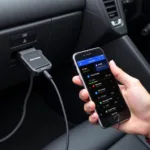While OBD2 scanners are incredibly useful tools for car owners and mechanics, they aren’t without their limitations. Understanding the potential drawbacks of OBD2 scanners can help you set realistic expectations and utilize them more effectively.
OBD2 Scanner Disadvantages: What You Need to Know
Despite the many advantages of owning and using an OBD2 scanner, some disadvantages exist. Here are some key limitations to be aware of:
Limited Scope of Information
An OBD2 scanner can only provide information related to the engine and emissions systems. It won’t give you insights into other systems like the airbag system, ABS, or body control module.
“While an OBD2 scanner can tell you about a problem with your oxygen sensor, it won’t necessarily tell you why the sensor failed,” says automotive electronics expert, John Miller. “Additional diagnostics might be needed to identify the root cause.”
Potential for Misinterpretation
OBD2 scanners provide diagnostic trouble codes (DTCs), which are standardized codes that indicate specific issues. However, interpreting these codes accurately requires some automotive knowledge. Misinterpreting a code can lead to unnecessary repairs or even worsen the problem.
Compatibility Issues
While OBD2 standardization has improved vehicle compatibility, some older vehicles might have different protocols, making it challenging to find a compatible scanner. Some high-end scanners may require specific software or subscriptions for full functionality with certain car makes and models.
Cost Considerations
The price of OBD2 scanners varies significantly, from budget-friendly options to professional-grade tools with advanced features. While basic scanners can be affordable, investing in a high-quality scanner with comprehensive functionality can be costly.
Security Concerns
As vehicles become increasingly connected, the OBD2 port has emerged as a potential entry point for hackers. While rare, there have been instances of unauthorized access through the OBD2 port, highlighting the need for caution and security measures.
Overcoming OBD2 Scanner Limitations
While OBD2 scanners have limitations, understanding and mitigating these drawbacks is possible.
- Invest in a quality OBD2 scanner: Choose a scanner from a reputable brand known for its accuracy, reliability, and compatibility.
- Consult reliable resources: Utilize online resources, forums, and repair manuals to understand DTCs and their potential causes thoroughly.
- Seek professional help when needed: Don’t hesitate to consult a qualified mechanic for complex issues or if you’re unsure about interpreting the information from your scanner.
Conclusion
OBD2 scanners are invaluable tools for diagnosing and troubleshooting car problems. However, understanding their limitations is crucial to manage expectations and utilize them effectively. By being aware of the potential drawbacks and taking appropriate precautions, car owners can leverage the power of OBD2 scanners to maintain their vehicles and make informed repair decisions.

